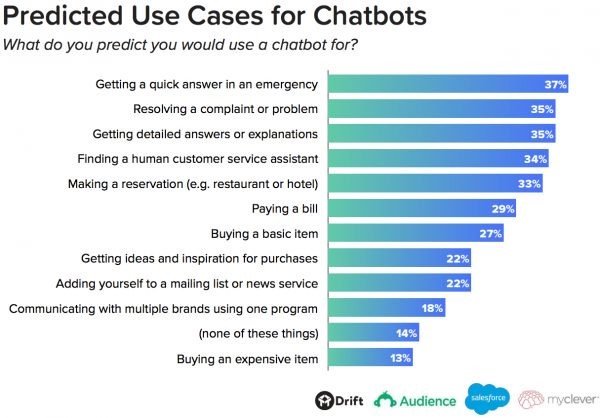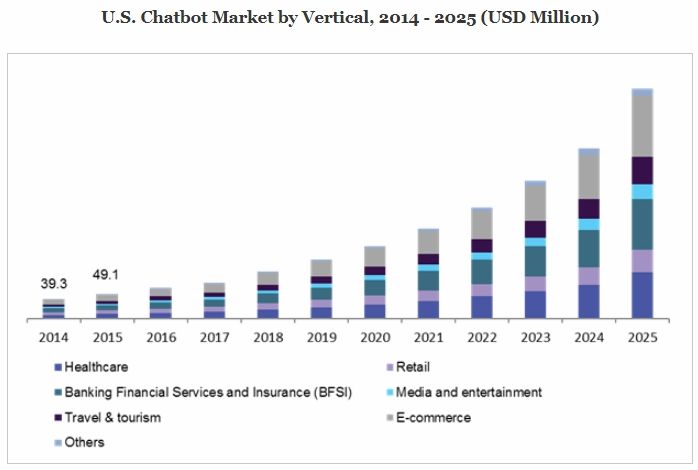If you consider chatbots just another marketing fad or buzzword with no impact on revenue, we have some bad news for you. Chatbots are an integral part of modern customer experience.
There are over 300,000 active chatbots on Facebook Messenger alone. But it's not all about Facebook. WhatsApp, Telegram, Viber, Twitter, or just regular website chatbots are growing in numbers by the minute.
In this article, we'll talk about the impact that chatbots can have on your conversion rate optimization efforts.
'Time Is Money'
That statement has never as much literal significance as it does now. The variety of products and services today, and the resulting competition, is astonishing. The Internet has brought all competitors together in one "place"; now, you have to face all of them.
In such an environment, getting the customer's attention and providing timely support is paramount to your success and your conversion rate metrics. That's where chatbots come in.
- They're available 24/7. Unless you have the cash to throw around, keeping a 24/7 live chat staff is a pretty costly endeavor.
- You often have less than a minute to engage a person and generate their interest. LeadConnect has found that your conversions can be almost 400% higher if you call a potential lead within the first minute. You can use a chatbot to achieve the same immediacy by triggering form fills. Or you could use a chatbot instead of form fills and forget about calls altogether.
- Chatbots can be used as a gateway to human interaction: Already, one-third of consumers are OK with using a chatbot before being transferred to a human operator. This allows you to set up the bot as a filtering system, where it responds to all of the basic questions, and only the users with the most pressing issues are escalated to real operators.
Better Customer Service = Better Conversions
Gartner predicts that by 2020 over half of all customer support interactions will be performed by bots. They're the ultimate customer support automation tool for various reasons: They're available 24/7/365, and they can be set up pretty quickly. Potential salary savings for companies using chatbots for customer care can reach almost 30%.
Chatbots can have a significant impact on many customer service routines:
- The speed of response is often considered one of the most impactful customer satisfaction metrics in customer care. Gen Z customers, who will account for 40% of consumers by 2020, are more likely to drop a brand because of slow response times. On the same note, 66% of Millennials expect real-time responses.
- Customers seek instant answers to the most basic and frequently asked questions—a fact that sits squarely within the narrative of the necessity of timely customer support. Fully 37% of customers are using chatbots mainly to get answers to those basic questions. They don't expect human-like communication in those situations; customers understand the purpose of chatbots and the limitations of their capabilities.
Choosing to completely automate your customer support is likely not a good idea. Chatbots aren't sophisticated enough to handle all of the customer interactions. But they can play well within an integrated customer support strategy that makes use of available technologies.
The benefits are obvious. Companies with better customer experience grow revenues 4-8% above their market average. The cost-savings noted earlier would provide a nice boost to your profit margins as well.
Augmenting Sales
Chatbots can be a powerful sales tool because of the current market makeup. Around 75% of Millennials prefer text-based communication to phone calls. That communication pattern will only become stronger with younger generations, which have grown up online, connected 24/7.
Some major businesses around the world are already reaping the benefits of chatbot applications:
- Facebook Messenger chatbots helped BabyCenter improve engagement over 1,000-fold compared with email marketing.
- MongoDB was able to improve the number of created sales opportunities 170% by using chatbots.
- Amtrak, the largest railroad carrier in the United States, used Julie, its chatbot, to improve sales assistance capabilities, resulting in a 25% increase in ticket bookings.
There are other ways to use chatbots in the sales process. For example, relevant discount offers and promotions are expected from a chatbot by 40% of consumers, and people who do buy through a chatbot are willing to spend upwards of $400 on their purchases.
Another source of potential conversions is the leads that weren't selected by your sales team. Because of the way salespeople are incentivized, representatives are very selective about the leads that they choose to engage. They don't want to waste time talking to someone who's not going to convert. In that scenario a chatbot could target the untouched leads.
For example, in KnowledgeVision was able to convert around 8% of leads that were previously untouched. That's almost a 10% increase in the number of sales that would have otherwise been lost.
Deloitte notes sales support is one of the biggest use cases of chatbots. When routine tasks can be offloaded to a chatbot, your sales and marketing teams can focus on the more intricate parts of the sales funnel.
Natural product discovery is also an essential part of the sales cycle. Product recommendations are a powerful tool, which can generate up to a quarter of your revenue. Chatbots are well suited to this task. Platform-agnostic solutions, like GoBot, are built around recommendation capabilities. The primary purpose of the famous H&M Kik bot is outfit recommendations.
What's Next for Conversion Rate Optimization and Chatbots?
Chatbots will be dramatically affected by the advances in artificial intelligence and natural language processing, which would make them more conversational and effective.
By the end of 2019, 40% of large enterprises will have implemented chatbots/intelligent assistants. Moreover, over 25% of the global population will be using messaging apps, which will help to proliferate chatbot adoption. Even now, roughly 40% of Millennials interact with bots on a daily basis, which means that these types of customer interactions will only be further normalized.
Of course, there's some skepticism; not long ago some industry observers predicted the end of the chatbot craze. But, as we can see now, the market is expanding with a projected 46% annual growth rate by 2025.
* * *
There's no point in delaying a chatbot project. Your competitors are probably already implementing one. Now is the time to properly set up and fine-tune a chatbot based on your specific conversion optimization goals.






